|
|
|
Sort Order |
|
|
|
Items / Page
|
|
|
|
|
|
|
| Srl | Item |
| 1 |
ID:
077354
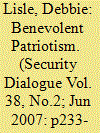

|
|
|
|
|
| Publication |
2007.
|
| Summary/Abstract |
This article examines the role of contemporary art in a post-9/11 context through The American Effect exhibition at the Whitney Museum of American Art in New York in 2003. This exhibition displayed a range of artworks from around the world that specifically engaged with, commented upon and interrogated the USA's pre-eminent position as a global superpower. In the politically charged climate after 9/11, the exhibition offered itself as a critical voice amid the more obvious patriotic clamour: it was one of the places where Americans could ask (and answer) the question, `Why do they hate us so much?' Although The American Effect claimed to be a space of dissent, it ultimately failed to question, let alone challenge, US global hegemony. Instead, the exhibition articulated a benevolent patriotism that forced artwork from other nations into supplicating and abject positions, and it obscured the complex discursive networks that connect artists, curators, critics, audiences and art museums
|
|
|
|
|
|
|
|
|
|
|
|
|
|
|
|
| 2 |
ID:
119952
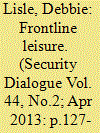

|
|
|
|
|
| Publication |
2013.
|
| Summary/Abstract |
This article argues that the terrorist bombings of hotels, pubs and nightclubs in Bali in October 2002, and in Mombasa one month later, were inaugural moments in the post-9/11 securitization of the tourism industry. Although practices of tourism and terrorism seem antithetical - one devoted to travel and leisure, the other to political violence - this article argues that their entanglement is revealed most clearly in the counter-terrorism responses that brought the everyday lives of tourists and tourism workers, as well as the material infrastructure of the tourism industry, within the orbit of a global security apparatus waging a 'war on terror'. Drawing on critical work in international relations and geography, this article understands the securitization of tourism as part of a much wider logic in which the liberal order enacts pernicious modes of governance by producing a terrorist threat that is exceptional. It explores how this logic is reproduced through a cosmopolitan community symbolized by global travellers, and examines the measures taken by the tourism industry to secure this community (e.g. the physical transformations of hotel infrastructure and the provision of counter-terrorism training).
|
|
|
|
|
|
|
|
|
|
|
|
|
|
|
|
| 3 |
ID:
169945
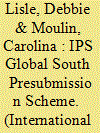

|
|
|
|
|
| Summary/Abstract |
M. grew up in Gambia. Married at twelve, to a man she did not know, she soon became pregnant and gave birth to a baby girl. She raised her, under abusive conditions. By the time her daughter turned eleven, M. knew her child would face the same fate of a forced marriage in Gambia. She decided to flee. She applied for asylum and managed to get protection in Brazil. Living in difficult conditions, learning a language and a set of social expectations in a country ravaged by racial and gender discriminations, M. endured for the sake of her own freedom and that of her daughter.
|
|
|
|
|
|
|
|
|
|
|
|
|
|
|
|
| 4 |
ID:
140512
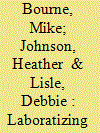

|
|
|
|
|
| Summary/Abstract |
This article critically interrogates how borders are produced by scientists, engineers and security experts in advance of the deployment of technical devices they develop. We trace how sovereign decisions are enacted as assemblages in the antecedent register of device development through the everyday decisions of scientists and engineers in the laboratory, the security experts they engage, and the material components of the device itself. Drawing on in-depth interviews, observations, and ethnographic research of the EU-funded Handhold project, we explore how assumptions about the way security technologies will and should perform at the border shape the development of a portable, integrated device to detect chemical, biological, radiological, nuclear and explosives (CBRNE) threats at borders. In disaggregating the moments of sovereign decision-making across multiple sites and times, we question the supposed linearity of how science comes out of and feeds back into the world of border security. An interrogation of competing assumptions and understandings of security threats and needs, of competing logics of innovation and pragmatism, of the demands of differentiated temporalities in detection and identification, and of the presumed capacities, behaviours, and needs of phantasmic competitors and end-users reveals a complex, circulating and co-constitutive process of device development that laboratises the border itself.
|
|
|
|
|
|
|
|
|
|
|
|
|
|
|
|
| 5 |
ID:
164284
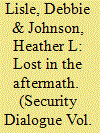

|
|
|
|
|
| Summary/Abstract |
What happens when violence disappears? What is left in the backwash of crisis? Who attends to the emotional, material and ideational detritus of closing borders? Like many, we are working in the aftermath of the recent and deadly intensification of EU migration. We contest the widespread account that the ‘crisis’ is now over – that policymakers have effectively ‘solved’ the problem of migration by gathering undocumented subjects into infrastructures of containment. We focus instead on the painful traces of EU migration that continue to be produced by global structures of citizen/alien, legal/illegal, friend/enemy. We do not produce a comprehensive diagnosis, normative argument or critical framework. Instead, we rest awhile in the aftermath of the crisis – specifically on the Greek island of Kos – to think about questions of abandonment, erasure and displacement. This is a visual essay representing a conversation between two researchers as they interact with the aftermath of the refugee crisis on Kos. Reflecting on select images from September 2016, we present a dialogue that directly speaks to a core theme each image raises. In doing so, we question some of the basic assumptions about how to do critical analysis on migration, security and borders, and therefore seek to disrupt dominant modes of academic writing as well as the practice of research itself.
|
|
|
|
|
|
|
|
|
|
|
|
|
|
|
|
| 6 |
ID:
175121
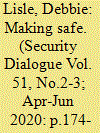

|
|
|
|
|
| Summary/Abstract |
In the Ulster Museum’s new gallery The Troubles and Beyond, the central display showcases a Wheelbarrow bomb disposal robot. This machine was invented by the British Army in Northern Ireland in 1972 and used by officers of the 321 Explosive Ordinance Disposal Squadron (321EOD) to defuse car bombs planted by the Irish Republican Army (IRA). This article offers an alternative history of that machine – a dirtier history – that critically assesses its role during the Troubles. Centrally, the article contests the British Army’s preferred account of this machine as a ‘game-changing’ technological innovation in counterinsurgency, and their understanding of themselves as benign peacekeepers. Rather than figure the Wheelbarrow robot as an unreadable ‘black box’ used instrumentally by the superior human operators of 321EOD, this article seeks to foreground the unruly transfers of agency between the machine and its operators as they tested and experimented in the exceptional colonial laboratory of Northern Ireland. The article further explores the machine’s failures during bomb disposal episodes, the collateral damage that resulted, and the multiple and often unruly reactions of local populations who watched the Wheelbarrow robot at work. Providing a ‘dirty history’ of the Wheelbarrow robot is an effort to demonstrate that war can never be fully cleaned up, either through militarized mythologies of technological innovation or hopeful museum displays.
|
|
|
|
|
|
|
|
|
|
|
|
|
|
|
|
| 7 |
ID:
182448
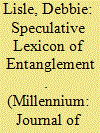

|
|
|
|
|
| Summary/Abstract |
This intervention offers a speculative lexicon to help students and scholars of global politics think critically and creatively about entanglement. It is neither definitive nor complete, but instead offers some possible points of entry into a contested field. It mobilises two particular claims: (1) that entanglement always involves both human and non-human entities; and (2) that entanglement is always emergent and in process. As a whole, this speculative lexicon is intended to help us sense the moment when entanglements intensify in ways that render them stable; attune to these durabilities in order to analyse their constitutive logics of inclusion/exclusion; acknowledge our own irrevocable entanglement in these logics; care for those bodies, lifeworlds, species and habitats that are targeted or abandoned by such logics; and craft mutual projects to disrupt, disaggregate and re-route these logics. Because entanglements are always emerging, dissipating and reconvening, the practice of navigating this open terrain is disorienting and often frustrating. We may desire a final destination where entanglements solidify and horizons magically appear, but giving in to that desire reproduces the violence of enclosure. This lexicon is offered as a way to keep the political terrain of entanglement open so we can collectively ensure that contestation remains a possibility.
|
|
|
|
|
|
|
|
|
|
|
|
|
|
|
|
| 8 |
ID:
150571
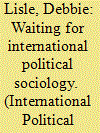

|
|
|
|
|
| Summary/Abstract |
This paper uses the work of Samuel Beckett to reflect on the in-between positionality of International Political Sociology (IPS) and offers a field guide to help scholars, students, and thinkers embrace this disposition more energetically. It makes the case for a more balanced transdisciplinarity that keeps the field of inquiry open while attending to the international, the political, and the social at the same time and in equal measure. The power of this in-between approach is that it forces thinkers in IPS to constantly look at the horrors of our contemporary world without turning away. Through the ambivalent position of the “happy wreck,” this paper explores the need to do something about these horrors (e.g., diagnose, act, intervene) while fully acknowledging that such actions always produce new forms of violence and exclusion. To help thinkers in IPS inhabit this challenging space of inquiry more confidently, the paper makes four suggestions: (i) broadening our emotional responses to the horrors of the world; (ii) resisting resolution through non-cathartic dispositions; (iii) pursuing slow research to contest dominant rhetorics of crisis and emergency; and (iv) re-imagining shared conditions of vulnerability.
|
|
|
|
|
|
|
|
|
|
|
|
|
|
|
|
| 9 |
ID:
114113
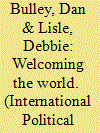

|
|
|
|
|
| Publication |
2012.
|
| Summary/Abstract |
London's successful bid for the 2012 Olympic Games presented a diverse, cosmopolitan city opening its arms and "welcoming the world." This article explores the apparently benign gesture of hospitality contained in London's official candidature files submitted in 2004 and asks how such a promise of inclusiveness is managed. We argue that London's depiction of itself as hospitable to every kind of visitor relies on subtle techniques of governmentality in which the subject positions of "host" and "guest" are imagined and produced in ways that make them more governable. By this, we are not referring to acts of authority, coercion, or discipline that exclude subjects or render them docile bodies within a rigid panoptical city. Rather, we are referring to the delicate ways in which the official bid document imagines and produces the ideal subject positions of host and guest and in so doing enables, encourages, and incentivizes certain behaviors. This analysis of urban welcoming takes us beyond reductive oppositions of hospitality and hostility, inclusion and exclusion, self and other. It focuses instead on how London's inclusive welcome produces a variety of host and guest positions (for example, the "Olympic Family," volunteers, guest workers), segregates them within the city, and then "conducts their conduct" in the areas of planning, security, transport, accommodation, education, and training. By analyzing the techniques of governmentality at work in London's 2004 bid document, this article foregrounds the enabling form of power driving the city's inclusive welcome and exposes its inherent micropolitics.
|
|
|
|
|
|
|
|
|
|
|
|
|
|
|
|
|
|
|
|
|